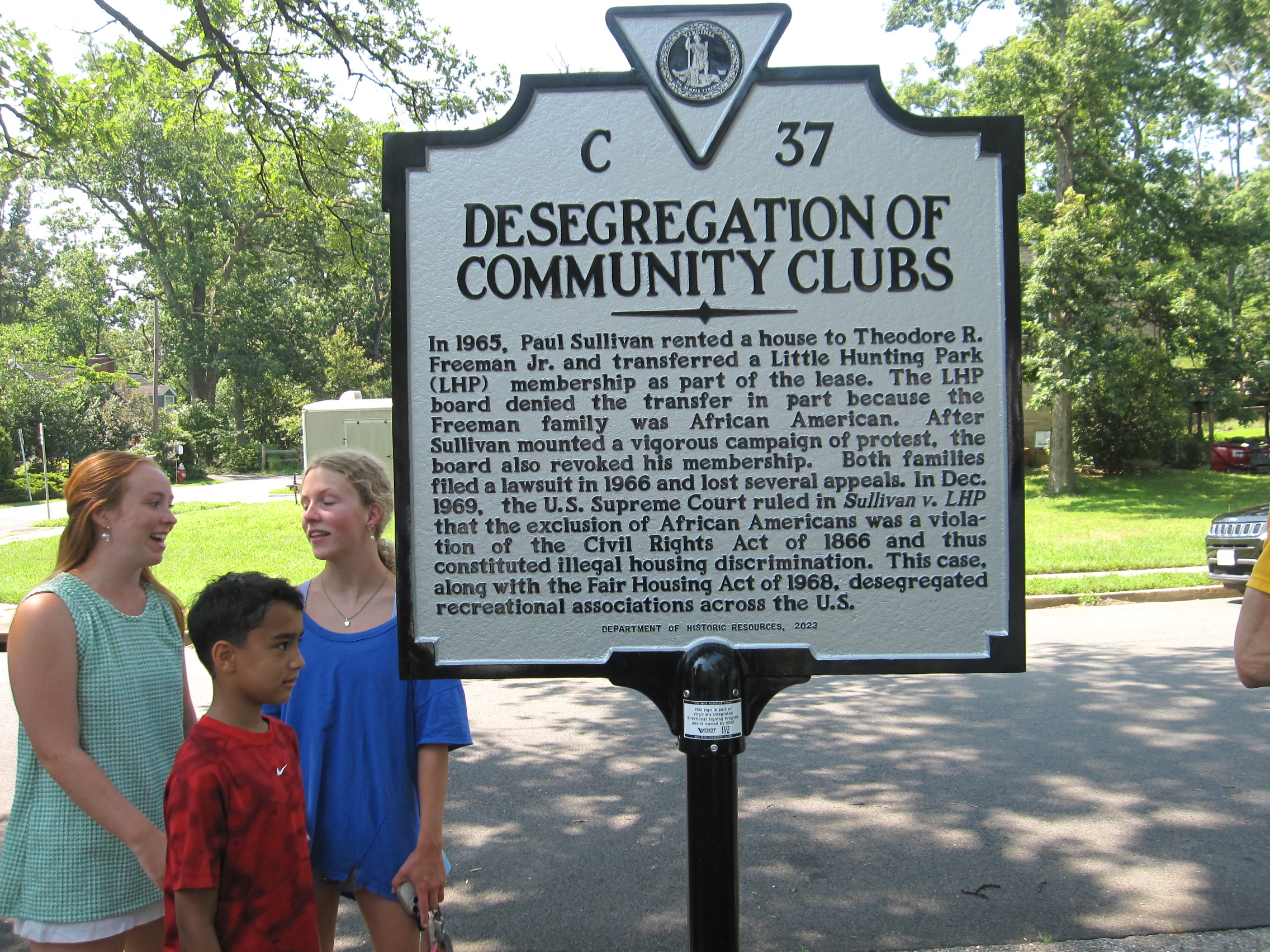Wednesday, July 2, 2025
We must tell the whole story, including the disturbing chapters, several speakers urged at the June 29 dedication of a new Virginia marker in Little Hunting Park in Mount Vernon’s Bucknell community.
The marker recognizes the dogged efforts of the late Paul Sullivan, a former community member who died in
In 1965, Sullivan rented a house in the Bucknell subdivision to Theodore R. Freeman Jr., and attempted to transfer his Little Hunting Park membership to the Freemans as part of the lease. The park’s board denied the transfer in part because the Freeman family was African American. The board revoked Sullivan’s membership.
In 1966, the Sullivan and Freeman families filed a lawsuit and lost several appeals. In December 1969, the U.S. Supreme Court ruled in Sullivan v. Little Hunting Park that excluding African Americans was a violation of the Civil Rights Act of 1866 and illegal housing discrimination.
History Right Here
Welcoming 70 attendees on a sauna-like Sunday morning, Jamie Atala, the park Board’s president, said, “History is not just written in textbooks. It’s living right here.” Today’s 10-acre park is 70 years old, has 545 members and is home to the Gators swim team, she noted.
Julie Langan credited Mount Vernon resident and Virginia Senator Scott Surovell for suggesting the marker. “Otherwise, we would never have known about it,” she said. Langan, who drove from Richmond, is the Director of the Virginia Department of Historic Resources.
When the state’s marker program began in 1927, “At first, we failed to tell the full story,” she said, reporting that before 1930, three out of 700 markers related to African-American history. Today, out of 2,600 markers, 480 or 18 percent do, “still a low number,” she contended, adding, “This brings us closer to the marker system we’re trying to achieve.”
Surovell related some of Northern Virginia’s scarred history. He recalled that when his Surovell grandparents moved from New York City to Northern Virginia, “Fairfax was not very welcoming at times to Jewish people.” His grandparents helped abolish the poll tax then required for voting. The Harper v. Virginia Board of Elections case decided by the U.S. Supreme Court in 1966 found that the poll tax violated the U.S. Constitution. “That case originated here,” he said. Fairfax County Public Schools were not fully desegregated until 1966, but even with that progress, swimming pools still had discriminatory racial admissions policies.
Surovell learned about the Little Hunting Park case when he read Sullivan’s obituary in 2011 and decided to learn more. Sullivan faced threats in the neighborhood, including having his mailbox blown up. Some park members feared that by admitting African Americans, membership would decline. The Fairfax Circuit Court and the Virginia Supreme Court both “threw out the case,” Surovell said. Sullivan persisted.
In 1969, the U.S. Supreme Court ruled in a five to three vote in favor of the Sullivans and Freemans.
“Every pool in America became desegregated because of what happened here,” Surovell said. “It’s important to recognize what happened here and honor their struggles.”
Mount Vernon Supervisor Dan Storck encouraged people to make a difference. “Things happen because someone took a stand,” he said. “It takes steely determination for individuals to stand up. We all are responsible for making a difference and we cannot let past barriers get in the way,” he said.
Liam Sullivan, Paul’s grandson, came from Bristow, Virginia, and led the unveiling. His son, Luke, age 16, said, “It’s awesome to see my great-grandfather recognized.” Paul’s daughter, Isabelle, who came from Richmond, remembers her father’s efforts starting when she was ten. “This is wonderful,” she said. “This would make my parents happy.”
Jube Shiver, a local resident who grew up nearby, lauded the “symbolism and history” of the marker.
Mount Vernonite Jane Schaffner recalled reading about this case in her first year of law school at Georgetown University.
Despite the oppressively humid heat, spirits were high and gratitude was all around.
Virginia’s historical highway marker program, the oldest in the United States, began in 1927 with installation of the first markers along U.S. Route 1.
The park and marker are at 7000 Canterbury Lane, near Quander and Beacon Hill Roads.
Note: Writer Glenda Booth is the mother of Sen. Scott Surovell.
The Marker’s Full Text:
Desegregation of Community Clubs